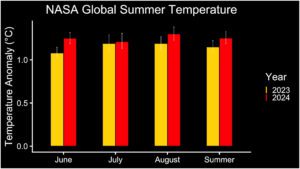
This bar graph shows GISTEMP summer global temperature anomalies for 2023 (shown in yellow) and 2024 (shown in red). June through August is considered meteorological summer in the Northern Hemisphere. The white lines indicate the range of estimated temperatures. The warmer-than-usual summers continue a long-term trend of warming, driven primarily by human-caused greenhouse gas emissions. (Image Credit: NASA/Peter Jacobs)
August 2024 set a new monthly temperature record, capping Earth’s hottest summer since global records began in 1880, according to scientists at NASA’s Goddard Institute for Space Studies (GISS) in New York. The announcement comes as a new analysis upholds confidence in the agency’s nearly 145-year-old temperature record.
June, July and August 2024 combined were about 0.2 degrees Fahrenheit (about 0.1 degrees Celsius) warmer globally than any other summer in NASA’s record—narrowly topping the record just set in 2023. Summer of 2024 was 2.25 F (1.25 C) warmer than the average summer between 1951 and 1980, and August alone was 2.34 F (1.3 C) warmer than average. June through August is considered meteorological summer in the Northern Hemisphere.
